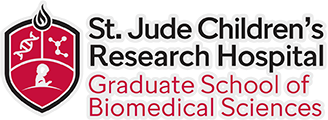The St. Jude Children’s Research Hospital Graduate School of Biomedical Sciences evaluates student learning and success consistent with our mission to fundamentally advance global health and to find cures for pediatric catastrophic diseases by enhancing education across disciplines and training future leaders and innovators.
What are Student Learning Outcomes?
Student Learning Outcomes (SLOs) are statements of the knowledge, skills and abilities individual students should possess and can demonstrate upon completion of a program. Program data allows us to critically analyze information about our activities, characteristics and outcomes to improve its effectiveness. Data also helps inform programming decisions for the purpose of improving student learning and development.
Our SLOs are a collection of performance indicators and statements that clearly state the expected knowledge, skills, attitudes and competencies students are expected to acquire in their program of interest. We collect and analyze data to inform institutional decision-making, improvement planning, problem identification, curriculum planning, goal setting, faculty development, course revision, program review and accountability.
SLOs for each academic program are listed below.
Doctor of Philosophy in Biomedical Sciences
- SLO 1: Demonstrate mastery knowledge of central biomedical concepts and competency in biomedical research methods and strategies.
- SLO 2: Critically evaluate the scientific literature in the biomedical sciences, including the choice of methods applied to problems and the interpretation of results.
- SLO 3: Develop the ability to think critically and work collaboratively to design rigorous and reproducible experiments in order to solve scientific questions.
- SLO 4: Communicate clearly, accurately, and professionally to disseminate scientific concepts and research results in visual, oral, and written form to diverse audiences.
- SLO 5: Plan and execute, with independence, original and extensive laboratory research that advances knowledge in the selected area of concentration in the biomedical sciences.
- SLO 6: Demonstrate advanced ability to effectively write and publish technical documents.
Master of Science in Applied Biomedical Data Sciences
- SLO 1: Understand and appropriately apply advanced statistical and computational analysis tools to facilitate scientifically rigorous interpretation of biomedical research data.
- SLO 2: In collaboration with biomedical and data science colleagues, develop and execute plans to complete the data scientific components of a biomedical research project including formulation of scientific questions, study design, data acquisition, data management, data analysis, and dissemination of research findings.
- SLO 3: Communicate clearly, accurately, and professionally to disseminate scientific concepts and research results in visual, oral, computational, and written form to diverse audiences.
Master of Science in Clinical Investigations
- SLO 1: Apply an understanding of the fundamental concepts of biostatistics, epidemiology, clinical research, and research methods to a research project.
- SLO 2: Critically evaluate scientific literature in clinical research, including the choice of methods applied to problems and the interpretation of results.
- SLO 3: Design and conduct clinical research using advanced research skills, data acquisition, data management, and analysis to investigate a selected research problem.
- SLO 4: Communicate clearly, accurately, and professionally to disseminate scientific concepts and research results in visual, oral, and written form to diverse audiences.
Master of Science in Global Child Health
- SLO 1: Demonstrate competency in research methods and apply analytical frameworks in research design, data acquisition, analysis, and interpretation
- SLO 2: Understand the concepts, determinants, and implementation principles of global health and health systems.
- SLO 3: Examine, interpret, and apply information and data, to identify problems, construct problem-solving strategies, and create evidence-based programs and policies drawing concurrently from a variety of disciplines and through critical thinking
- SLO 4: Apply adaptive leadership and management principles and tools to design, implement, manage, and evaluate innovative programs, research, and policies in effective, sustainable, equitable and efficient ways
- SLO 5: Communicate clearly, accurately, and professionally to disseminate scientific concepts and research results in visual, oral, and written form to diverse audiences.

